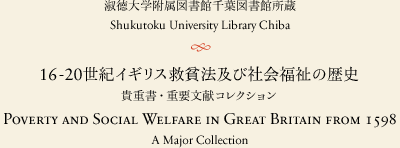 |
 |
 |
 |
1598
THE ELIZABETHAN POOR LAW |
001. ANNO XXXIX REGINAE ELIZABETHAE. Anno xxxix. Regime Elizabethae. At the Parliament begun and holden at Westminster the xxiii day of October, in the xxxix. yeere of the reigne of our most gracious soveraigne Lady Elizabeth, by the grace of God of England, France and Ireland Queene, defender of the faith, etc. And there continued untill the dissolution whereof, being the ninth of February next following, 1597. To the high pleasure of almightie God, and the weale publique of this realme, were enacted as followeth. Imprinted at London by the deputies of Christopher Baker, Printer to the Queens most excellent majestie. n.d. [1598]. Folio. A-H6,I4,Aa-Ee6,Ff-Gg4. A fine wide-margined copy rebound in nineteenth century calf. Some clear and attractive contemporary annotations of the Acts relating to the Poor. A handsome and attractive copy. Very rare in this state of preservation.
S.T.C. 9494. Containing both the Subsidies and Pardon sections missing in some copies. This year-book of Statutes contains Elizabeth I. XXXIX c. 1-6, the great Elizabethan Poor Law.
It can be inferred, according to the Webbs, that in the last quarter of the sixteenth century the social condition of the manual working class was changing considerably for the worse. Poor harvests, due in part to bad weather, meant rapidly rising food prices, culminating in the cold and rainy years 1594-1598, in dearth almost amounting to famine. The years 1596-1597 were specially critical periods of high prices, threatened rebellion and extreme poverty. It was reported that the towns were full of beggars and that men and women died of want in the streets. When a new Parliament met in 1597, after an interval of four years, the chronic situation of the poor was the main topic of concern. Francis and Nicholas Bacon, Thomas and William Cecil, Lords Cole and Burleigh were among senior politicians who were actively involved in drafting legislation. The House of Commons recommended and the House of Lords passed a set of six statutes as follows:
(a) 39 Elizabeth c. 1. An Act against the decaying of townes and houses of husbandrie.
(b) 39 Elizabeth c. II. An Acte for the mintenance of Husbandrie and tillage.
(c) 39 Elizabeth c. III. An Acte for the reliefe of the Poore.
(d) 39 Elizabeth c. IIII. An Acte for punishment of Rogues, Vagabonds, and sturdie beggars.
(e) 39 Elizabeth c. v. An Acte for erecting of Hospitals, or abiding and working houses for the poore.
(f) 39 Elizabeth c. vi. An Acte to reforme deceipts and breaches of trust touching lands given to charitable uses.
Of these six acts the most important was the third the Acte for the relief of the Poore. This Act is the basis of the legal duty of the state to relieve the poor. It required the appointment, in every parish, of Overseers of the Poor, and specifically imposed upon them, in conjunction with Church-wardens, the duty of providing for all the various. classes of the destitute, whether able-bodied or impotent, children or aged, lame or blind, or otherwise "without means to maintain themselves". The Justices were empowered to commit to the House of Correction any one refusing to work; and also to issue a warrant of distress against, and commit to prison, any one failing to pay the Poor Rate. What Bacon, Cecil and Coke achieved by redrafting the confused statutes of the preceding years was a law, drastic, direct and explicit in its commands and one which, in setting out unequivocally the duty of the state to provide for the poor, formed the basis of all subsequent legislation.
|
 |
|
 |
 |
 |
 |
|



